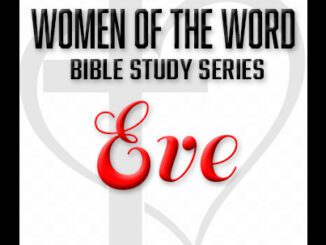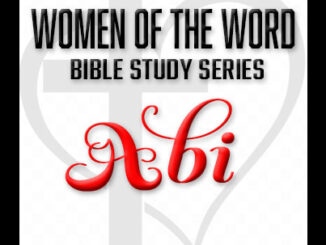by Trisha Bleau Smith
Scriptural References:
Exodus 15:20-21; Numbers 12:1-15; Numbers 20:1; Numbers 26:59; Deuteronomy 24:9; Micah 6:4
Name Meaning:
bitterness and/or rebellion
Introduction:
Miriam was a woman of great influence, a leader among Israel. But she was also a woman who God rebuked for negative actions. There is much we can learn from the life of Miriam.
Lesson:
Miriam is first introduced to us as a child. She is the eldest daughter of Godly Hebrew parents. She is perhaps twelve or thirteen years old when Pharaoh decrees that all of the male Hebrew babies are to be killed. After hiding her newborn son for three months, her mother set Moses in the river in a small basket, with sister Miriam watching over him from the reeds (Exodus 2:6).
Pharaoh’s daughter bathed in the Nile daily. She discovered baby Moses floating in the river and had mercy on him, though she knew he was a Hebrew baby. Miriam’s wisdom is seen when she approaches Pharaoh’s daughter, offering to find a Hebrew nurse for the child. She is given the go ahead to find the nurse and takes baby Moses home to his mother (Exodus 2:7-8). We see immediately that Miriam is a quick thinker and has much intelligence. She is not instructed to do anything by her mother but watch the small babe floating down the river. But when given the opportunity to provide for his safety, she finds a way to bring him back to his mother. And not only that, her mother gets paid by Pharaoh’s daughter to care for him until he is old enough to be adopted fully and moved to the palace.
From this we can see that Miriam was taught to assist when necessary, to care for her brothers, and to assume responsibility. We will see this again later in Scripture when Miriam is leading alongside her brothers.
Miriam disappears from the Bible for a short while as the story continues. Aaron, their brother, comes into the picture and the two men begin leading the Israelites in the Exodus from Egypt, in the famous story we are all familiar with. Can we assume that Miriam also had some part in helping to organize the Exodus and leading people out? It is only speculation on our part, because the Bible does not speak of her during those events.
Exodus 15:20-21 brings Miriam back into the story once again. Miriam is the first woman in Scripture to be called a prophetess. This passage also speaks of her leading the women in worship alongside Moses who is leading the men after crossing through the sea. At this point we see Miriam as a leader, alongside her brothers. She is a prophetess. When did this happen? When did God start speaking to her and why is Scripture silent on what He shared through her? But we know that Miriam had interests that were national and her mission was a political one. She led alongside the men, her brothers, one of the first women of the Bible to be a leader and given a title.
Miriam’s family life is unknown. The Jewish historian Josephus speaks of Miriam as the wife of another well known leader in Israel. He records that Miriam was the wife of Hur. But Scripture is silent on the subject. Perhaps this is true, perhaps it was just not of importance to the story. Many great women in history have been single women, women that God used for His will.
Miriam again disappears from Scripture. She reappears in Numbers 12. At that time, she and Aaron began complaining about Moses. Miriam’s name is listed first and she was the one punished harshly by God, which indicates that she was the instigator. It was in jealousy and bitterness that Miriam spoke. We can see their bitterness in the words: “Has the LORD spoken only through Moses?” they asked. “Hasn’t He also spoken through us?” (Numbers 12:2)
Miriam also questioned and complained about Moses’ choice for wives. She was fiercely patriotic and sought to provoke the anger in the people of the camp. God was angered that Miriam and Aaron would question the order He had established and He rebuked them for trying to seek more than their given role. It was not that they sought more for HIM, but their sin was that they wanted more for themselves.
Immediately following their attempts for more power, the Scriptures tell us that Moses was humble before the LORD, in contrast to Miriam and Aaron seeking self-glorification through the power of leadership. Their hearts were not in the right place. They wanted equal power with Moses, but that was not God’s will.
For this Miriam was punished. She became white with leprosy. She who once led was shamed and forced out of camp. The people prayed and Moses interceded on her behalf and 7 days later she was restored and healed. The Bible speaks no more of her role except to say that she never entered the Promised Land. She died before then. Some assume she was restored and continued to receive words from the Lord, others say all prophecies from Miriam ceased. The Bible is silent in regards to what happened after she returned to camp, except to say she died before entering the Promised Land.
Conclusion
There are many men who claim women are not allowed to be leaders. Miriam is only one example of a woman God placed into a leading role. Micah 6:4 recognized her among the two men who brought the people out of Egypt. There is no doubt that Biblical figures recognized Miriam as a leader appointed by the Lord.
But there is also a great lesson to be learned from Miriam. We can see that pride does indeed come before a fall, as is stated in Proverbs. Our motives must be pure, not selfish pursuit of self-glorification. We can see from this study that God does have a plan for each of us and that through being humble before Him, seeking His will and not our own, that He is glorified.








Be the first to comment